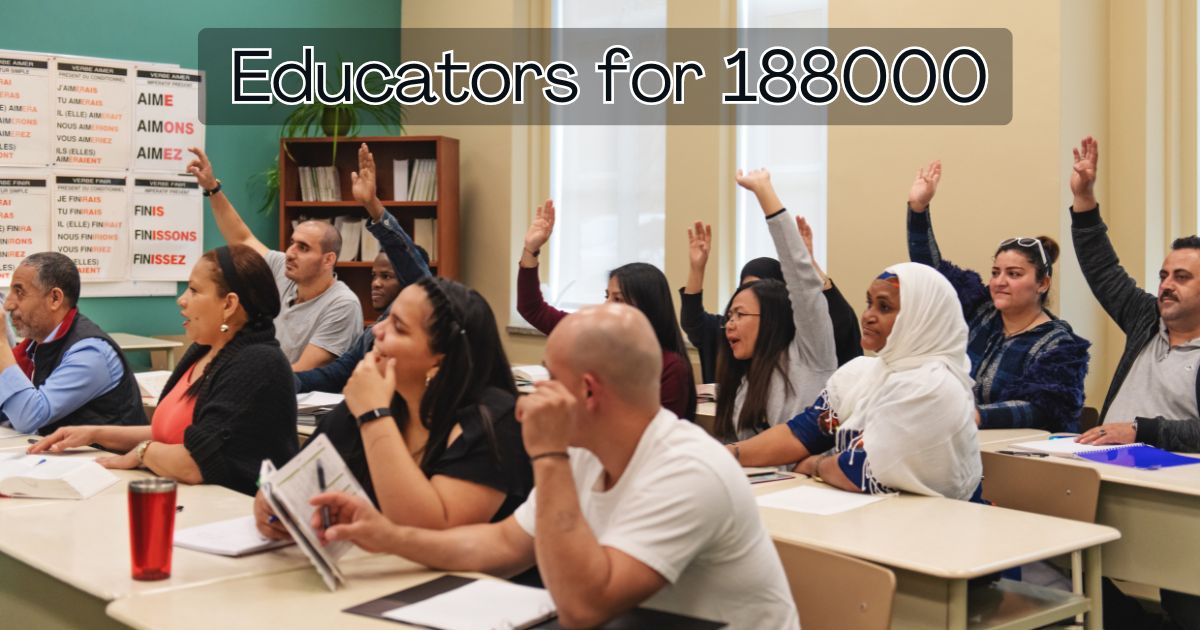The Educators for 188000 Initiative represents a groundbreaking effort to transform the educational landscape. This program focuses on empowering educators by providing essential resources, training, and support to enhance teaching practices. Educators involved in the initiative adopt innovative methods and technologies that significantly impact student outcomes. Exploring the role of these Educators for 188000 reveals how their commitment is driving the future of learning.
Importance of Addressing Educational Challenges
Addressing educational challenges is critical for improving student success and learning experiences. The initiative tackles issues like outdated teaching methods and disparities in resources. Through its comprehensive approach, it ensures that educators are well-equipped to provide high-quality education. Understanding the initiative’s impact helps recognize its value in overcoming these challenges.
Objectives of the 188000 Educator Initiative
Enhancing Teaching Practices
Enhancing teaching practices stands as a core goal of the 188000 Educator Initiative. The program offers targeted professional development and modern technology access to help educators refine their teaching strategies. Implementing evidence-based practices allows educators to engage students more effectively and improve learning outcomes. The focus on innovative methods ensures that educators remain effective and adaptable in their teaching.
Supporting Professional Development
Supporting professional development is another key objective of the initiative. Educators benefit from various opportunities to advance their skills through workshops, online courses, and mentorship programs. These resources provide the continuous growth needed to stay current with educational trends. By investing in professional development, the initiative enhances educators’ ability to meet their students’ needs effectively.
Promoting Equity in Education
Promoting equity in education is crucial for the initiative. It addresses disparities in educational resources and opportunities, particularly in underserved areas. By providing targeted support, the program aims to level the playing field for all students. Ensuring equitable access to quality education is essential for fostering a fair and inclusive learning environment.
Key Components of the 188000 Educator Initiative
Professional Development Programs
Professional development programs are central to the 188000 Educator Initiative. These programs include workshops, online courses, and mentorship opportunities designed to enhance educators’ skills. Hands-on training in new teaching methods and technologies helps educators implement innovative practices. Engaging in these programs equips educators with the knowledge and tools needed to improve their teaching and support their students effectively.
Access to Educational Technologies
Providing access to educational technologies is another vital component. Educators receive digital tools and resources, such as interactive software and educational apps, to enrich the learning experience. Modern technologies allow for the creation of engaging and interactive lessons that captivate students. Ensuring that educators have these tools supports the integration of technology into teaching and keeps pace with technological advancements.
Collaboration and Networking Opportunities
Collaboration and networking play a significant role in the initiative. Educators are encouraged to connect with peers, share best practices, and collaborate on educational projects. Networking events, online communities, and professional associations offer platforms for idea exchange and support. Building a network of peers fosters a sense of community and collective growth, enhancing the overall effectiveness of the initiative.
Implementation Strategies for Educators
Integrating New Teaching Methods
Integrating new teaching methods is a crucial strategy for educators in the initiative. They learn to incorporate innovative approaches such as project-based learning and flipped classrooms into their teaching. Experimenting with these techniques allows educators to engage students and address diverse learning needs effectively. Adapting methods to their specific classroom environments helps enhance the learning experience and improve educational outcomes.
Leveraging Data for Instructional Improvement
Leveraging data for instructional improvement is another essential strategy. Educators use data-driven insights to tailor their teaching practices and address student needs. Analyzing assessment results and feedback helps identify areas where additional support is needed. This data-driven approach allows educators to make informed decisions, monitor progress, and refine their instruction for better student outcomes.
Building Strong Student Relationships
Building strong relationships with students is vital for successful teaching. Educators in the initiative focus on developing positive connections to create a supportive learning environment. Understanding students’ needs, interests, and challenges enables educators to provide personalized support. Strong relationships lead to higher engagement, motivation, and academic success.
Impact on Student Learning
Improved Academic Performance
The 188000 Educator Initiative significantly impacts student learning by improving academic performance. Educators equipped with advanced methods and technologies create engaging learning experiences. Personalized instruction and interactive lessons lead to better academic outcomes, including higher test scores and improved grades. The initiative’s focus on enhancing teaching practices results in tangible improvements in student achievement.
Enhanced Student Engagement
Enhanced engagement is a key benefit of the initiative. Innovative teaching methods and technologies make learning more enjoyable and interactive. Interactive activities and collaborative projects capture students’ interest and keep them motivated. Increased engagement results in a more active learning process, where students are more likely to participate and take ownership of their education.
Development of Critical Thinking Skills
Fostering critical thinking skills is another positive outcome. Educators incorporate activities that challenge students to analyze, evaluate, and apply knowledge. Encouraging students to solve problems and think critically prepares them for future academic and career success. This emphasis on critical thinking helps students tackle complex issues and make informed decisions.
Also Read: MyFastBroker Trading Apps
Support Structures for Educators
Professional Development and Training
Professional development and training are essential support structures for educators. The initiative provides workshops, courses, and mentorship to enhance teaching skills. Training sessions cover new teaching methods, classroom management strategies, and educational technologies. These resources help educators stay updated and improve their ability to support students effectively.
Access to Educational Technologies
Access to educational technologies is crucial for effective teaching. The initiative offers tools like interactive whiteboards, educational software, and online platforms. Integrating these technologies into classrooms helps create dynamic and interactive learning experiences. The availability of these tools supports educators in delivering high-quality instruction and engaging students.
Collaboration and Networking Opportunities
Collaboration and networking opportunities offer significant support. The initiative promotes connections among educators through networking events and online communities. Sharing best practices and collaborating on projects helps educators stay informed and supported. Building a strong network of peers enhances professional growth and contributes to the success of the initiative.
Challenges and Criticisms
Addressing Resistance to Change
Resistance to change poses a challenge for the initiative. Some educators and institutions may be hesitant to adopt new methods or technologies. Addressing this resistance involves clear communication about the benefits and providing evidence of success. Support and addressing concerns build a culture of openness and adaptability necessary for successful implementation.
Overcoming Technological Barriers
Technological barriers can hinder the initiative’s effectiveness. Limited access to devices or unreliable internet connections may affect implementation. The initiative addresses these challenges by investing in infrastructure improvements and providing support for technical issues. Ensuring that all participants have the necessary resources is essential for achieving the initiative’s goals.
Ensuring Equity in Educational Opportunities
Addressing disparities in educational opportunities is a critical challenge. This initiative seeks to support underserved areas and educators, aiming to bridge gaps in access and resources. Achieving true equity involves ongoing efforts to identify and confront systemic inequalities. By focusing on providing essential resources and support to disadvantaged groups, the initiative contributes to creating a more inclusive and equitable educational system.
How Educators for 188000 Are Collaborating with Stakeholders
Partnerships with Educational Institutions
Educators for 188000 collaborate with educational institutions to enhance the initiative’s effectiveness. Partnerships with schools, universities, and organizations facilitate the sharing of resources and expertise. These collaborations align the initiative with institutional goals and integrate its strategies into existing frameworks. Working together creates a cohesive and impactful approach to educational improvement.
Engagement with Policy Makers
Engaging with policy makers is crucial for the initiative’s success. Educators advocate for supportive policies and funding to foster a conducive educational environment. Presenting evidence of the initiative’s benefits influences policy decisions and secures necessary resources. Collaboration with policy makers ensures that the initiative receives the support needed to achieve its goals.
Involvement of Parents and Communities
Involving parents and communities supports the initiative’s success. Educators work with families to enhance students’ learning experiences and encourage community involvement. Strong partnerships with parents and local organizations create a supportive network that extends beyond the classroom. Community engagement reinforces the initiative’s goals and enhances educational outcomes.
Evaluating the Impact of the 188000 Educator Initiative
Measuring Success and Effectiveness
Evaluating the impact of the initiative involves measuring success through various metrics. Key indicators include improvements in academic performance, teacher satisfaction, and the integration of new technologies. Regular assessments and feedback identify strengths and areas for improvement. Analyzing these metrics provides insights into the initiative’s overall impact and guides future strategies.
Collecting Feedback from Educators and Students
Collecting feedback from educators and students provides valuable insights into the initiative’s impact. Surveys, interviews, and focus groups gather information on experiences and perceptions. This feedback helps identify successes and challenges, guiding adjustments to the initiative’s strategies. Engaging with educators and students ensures that their needs and perspectives inform ongoing development.
Analyzing Long-Term Outcomes
Analyzing long-term outcomes offers a comprehensive view of the initiative’s impact over time. Tracking progress in areas such as student achievement and educator development provides insights into the initiative’s lasting effects. Long-term analysis ensures that the benefits of the initiative are sustained and continue to support educational advancement.
Successful Case Studies of Technology Integration
Examples from Schools and Districts
Successful case studies showcase schools and districts that have effectively integrated technology. Examples include one-to-one device programs and interactive learning tools. These cases demonstrate how technology enhances engagement and personalized instruction. By examining these examples, educators gain practical ideas for their own technology integration efforts.
Lessons Learned from Technology Integration
Lessons learned from technology integration provide valuable insights. Successful implementations highlight the importance of professional development, clear planning, and ongoing support. Understanding these lessons helps educators avoid common pitfalls and effectively incorporate technology into their classrooms. Applying these insights leads to meaningful improvements in education.
Future Directions for Technology Use in Education
Future directions for technology use explore emerging innovations and trends. Technologies like artificial intelligence and virtual reality offer exciting possibilities for education. Staying informed about these developments allows educators to integrate new tools and techniques. Embracing future advancements ensures that education remains dynamic and effective.
Future Prospects of the 188000 Educator Initiative
Expanding the Scope of the Initiative
Expanding the scope of the initiative involves reaching a broader audience. Plans may include increasing the number of educators, introducing new programs, and exploring innovative approaches. Expansion aims to enhance the initiative’s impact on educational practices and outcomes. Addressing emerging needs and opportunities will further support educators across diverse settings.
Long-Term Goals and Vision
The long-term goals and vision include creating a lasting impact on education. This vision focuses on fostering continuous improvement, supporting educator growth, and promoting equity. Ambitious goals drive positive change and ensure that the initiative’s benefits are sustained over time. The vision emphasizes ongoing collaboration and innovation.
Potential Challenges and Solutions
Potential challenges include adapting to educational trends and securing funding. Overcoming these challenges requires flexibility, responsiveness, and proactive problem-solving. Identifying solutions and staying attuned to the evolving education landscape is essential. Addressing these challenges ensures the continued success and impact of the initiative.
Conclusion
The educators for 188000 initiative represents a significant effort to enhance educational practices. Focusing on professional development, technology access, and collaboration, it improves teaching and learning outcomes. Despite challenges such as resistance to change and technological barriers, the initiative drives positive change through equity and innovation. Data and technology play crucial roles in enhancing effectiveness.
Continued support is essential for sustaining the initiative’s impact. Ongoing investment in professional development, technology, and collaboration ensures educators meet evolving student needs. A focus on equity and innovation drives positive change and improves educational outcomes. The commitment of all stakeholders is vital for the initiative’s success.
The success of the 188000 Educator Initiative relies on collective effort. Educators, institutions, policy makers, and communities are encouraged to support and participate actively. Working together fosters a more effective and equitable educational system. Your involvement is crucial for achieving the initiative’s objectives and making a difference in education.










